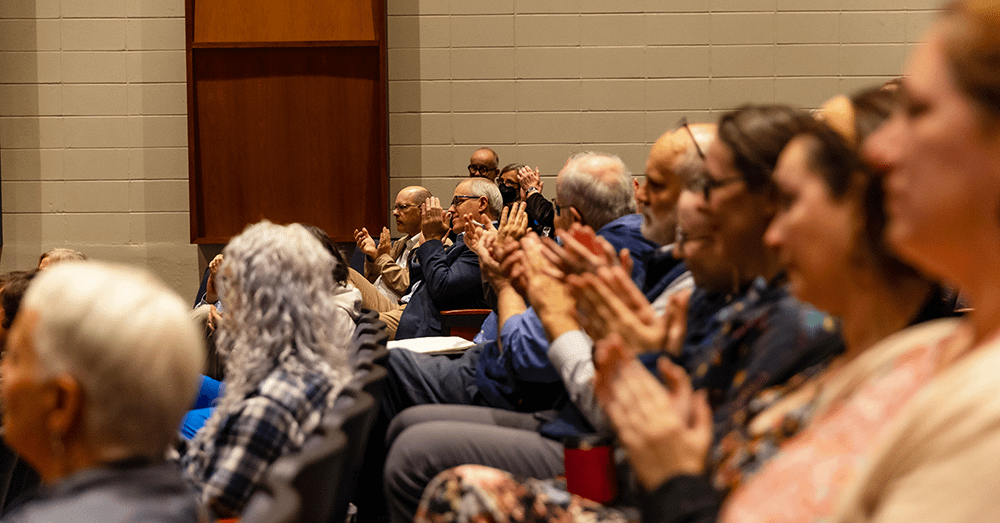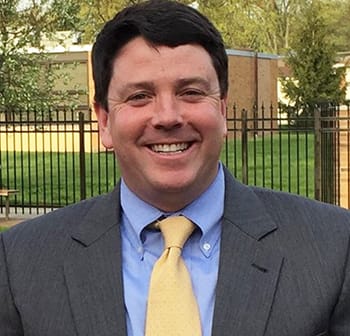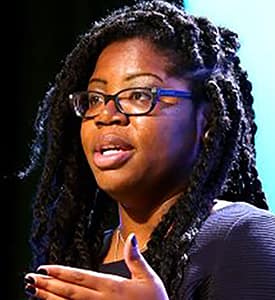Fellows map way through hard conversations at St. Mike’s
To come through the rough patches demands strong guides with useful tools.
Four Saint Michael’s women with track records as powerful and articulate student leaders showed they will be such guides for the campus community as it navigates through much-needed hard conversations about race and other social divides, particularly since the last national elections.
These four newly named “Fellows for Positive Engagement” — Leah Seften ’18, Lauren Stone ’19, Deirdre McPhee ’19 and Amy Garlesky ’18 (and a fifth to be named soon) are aiming to teach their peers and others at the College about productive and respectful dialogue by passing along tools they are learning in a new 20-student “pop-up class” for one credit.
It’s all possible because of a recently awarded major national grant to fund programming that will last at least through the end of this academic year and, they hope, beyond. Teaching that class are Trish Siplon of the political science faculty, Kimoi Seale of the Multicultural Affairs Office and Kerri Leach of Student Life – all in attendance for the luncheon.
Student Life leaders organized Wednesday’s event in Alliot’s Vermont Room to introduce and hear from the Fellows, who were competitively selected from among many more applicants. Each took a turn speaking and, in turn, showed clear vision, mature commitment, vivid personality and an arresting way with words.
Dawn Ellinwood, vice president for Student Affairs, said what excites her most is so directly addressing “the desperate need for us all across campus, across our country and across our world to know how to dialogue about anything, especially our difficult topics.”
Moise St. Louis, Saint Michael’s associate dean of students/director of the Center for Multicultural Affairs and Services, who led efforts to win the grant through the Boston-based non-profit Campus Compact, said it is a mistake to assume students, or even adults, have the needed skills without any training to hold conversations that pay due attention to full human dignity and respect — yet, having such skills that are transferrable to the workplace after college is essential. He gave examples of that need based on unfortunate occasions already this year of student groups that chose to be aggressively confrontational or became mired in rhetoric about challenging issues instead of engaging productively, since they lacked a “toolbox.”
St. Louis introduced the new Fellows to about 25 guests who represented a cross-section of campus offices and student groups, including Public Safety, Institutional Advancement, the Counseling Center, MOVE, the President’s Office and Marketing/Communications, the Student Association and Multicultural Center.
Here are the Fellows’ names and backgrounds, with “sound-bite” highlights from their talks:
Leah Seften ’18 is a senior neuroscience and psychology major, a student-athlete (cross-country captain), a leader in Campus Ministry and MOVE and also in Active Minds for Mental Health Awareness; she’s also a Founder’s Society Tour Guide and mentor. Among her shared thoughts: that it is “often is better to say something than nothing” on hard issues just to get dialogue going, but it’s worth imagining “how much more productive it could be if we had dialogue with both sides represented and feeling comfortable.” Later, during questions and answers, Seften made a well-received point when asked about students in her pop-up class about effective dialogue who might only be taking it for the credit, and are perhaps not authentically invested in the needed conversations: “I think it’s important that people who don’t necessarily see the importance of these conversations are part of them,” Seften said. “Feeling safe on campus and feeling wanted and included in the community affects how a student interacts with clubs and with their educations.”
Amy Garlesky ’18 spoke next. She’s a senior double-majoring in political science and philosophy, runs the campus radio station WWPV, and is secretary of academics for the Student Association. She spoke of the need to teach students skills beyond the classroom for communicating “with the people unlike themselves,” especially with an eye to their post-college lives. “The skills we learn have to be adaptable to skills after school when we move on,” she said, “because the world isn’t St. Mike’s. It’s important, in this time we’re in and with people so polarized, to show we really do have commonalities — maybe not to change someone’s mind, but to compromise, and see we are all people who think things for different reasons.”
“This is a community-building and restorative thing that we’re doing here,” Garlesky said.
Deirdre McPhee ’19, an art major exploring an economics minor, is president of Common Ground, the LGBTQI-plus group on campus dealing with gender and sexuality, and manager of the women’s lacrosse team and a former lacrosse player, she said. McPhee had listeners warming from the start of her talk to her ironic deadpan humor — reading from notes, she said, “so I wouldn’t forget some things — like my name and major.” But McPhee engaged serious topics: “After numerous incidents of hate last year I feel our student body is deeply divided, not unlike our society,” she said, “and by having different dialogue, we push people to think about their views and values which hopefully leads to growth.” She decided to try for the fellowship, since “I fare pretty well in difficult conversations and saying what needs to be said, and I want to learn to call people in more than call people out and alienating them.” She wondered how students are supposed to learn complex topics in class “if you are constantly looking over your shoulder or saying ‘I hope somebody doesn’t try to invalidate my identity today’ – it would be nice if I could go five minutes without that happening.” Later in questions, she spoke of “how change happens,” noting, “it’s not linear but all over the place, kind of zig-zaggy — but you definitely get there if you want to be” – and it might be a simple as the fellows and those in the class talking to friends talk to friends who talk to friends, until the things learned in classes and programs are widespread and commonly known.
Lauren Stone ’19 is a sociology major with a minor in creative writing, co-founder of the campus vegan club, a writing coach; she used a summer research grant to write a novel last summer. She also is a pre-orientation leader and a slam poet and performer — something she has “used to bring attention to social issues and misunderstandings about marginalized groups, including the disabled,” she said. Stone uses a wheelchair. “I’m privileged with the gift of words that can be used to make this campus more communicative,” said. “I lead by my actions, by art and poetry, and by my ability to empathize with those who don’t agree with what I say.” Not all dialogue needs to be spoken eye-to-eye, but also can be written, she suggested, and she’d like to explore that more. “We’re lucky that we’re human and get a chance to communicate through some medium,” she said. “I’m always lucky to have words, so I’m pretty excited to use them.”
During questions, Tara Arcury, representing the President’s Office, said President Neuhauser would have attended but had to be out of town that day. Siplon, Seale and Leach talked about the pop-up class they are teaching about how to have hard conversations, which began Thursday. Seale said that it is workshop-based. Siplon said it was a bit like trying to “build a boat while sailing it” since the teachers are “challenged by these issues too” and don’t have all the answers. “We’re acquiring skills as we’re teaching them … it’s nice we’re all having the experience together,” she said.
Saint Michael’s was among 40 institutions chosen nation-wide out of 400 applicants to participate in this Common Ground Fellowship program that trains student leaders to engage the campus community in positive, civil and constructive conversations. Among the fund recipients are well-known and prestigious colleges and universities, such as Yale, Tulane, Rutgers, Bard, Syracuse, Wagner, The College of Wooster, The Citadel, Oklahoma State, Lehigh, and Colorado State.
Doug Babcock, director of Public Safety, said a key will be “making sure you get more than just the choir in the room.” St. Louis (in the photo directly at left) agreed — that a big piece is putting those who initially resist dialogue “in a space where they can imagine” a different point of view and having such conversations, “because they might not choose that space for themselves, yet might enter those spaces” in the company of these Fellows and other peers if they present the opportunities. “If you can imagine it, you can have it,” St. Louis said.





